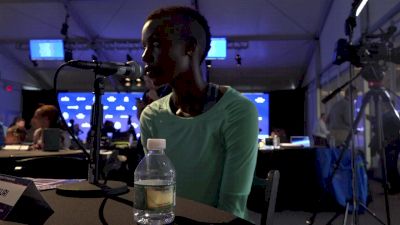Diane Nukuri inspired by training with experienced racers

Transcript by ASAP Sports
Q. Tell me about your mileage. What do you put in, and how long is your buildup here for this?
DIANE NUKURI: After the Olympics, I ran a 10K, I took a little down week where I didn't really do much. Three times in that week, I did a 30-minute stretch because I knew I had about three months to get ready for this.
Q. How much time off after the Olympics?
DIANE NUKURI: About a week off.
Q. That's kind of standard.
DIANE NUKURI: Yeah, it's kind of hard to go from that and then go home and start running 80, 90 miles that week. So I just took a down week where I just did what I wanted, just relaxed. Then when I got back home, I didn't have to start over, so I started 60, 70 miles that week.
Since I had a really good, consistent year, and I started racing in actually February when I was in Japan. So I knew I had a pretty good year with strength and speed. So I just kind of did about 100 to 110, and I did some cross-training as well, biking, elliptical, and was in the weight room a lot. So I feel like it would be a one. It would be my first marathon of the year. So I'm a lot more fresh than I would have been the year before or something like that.
So it's been good. But then again, it's so long. You just never know, but I feel like I'm prepared.
Q. Your best 10K is what?
DIANE NUKURI: On the track? 31:28. That's what I ran in Rio.
Q. What place did that get you?
DIANE NUKURI: 13th.
Q. That was a pretty solid PR, as I recall.
DIANE NUKURI: Not bad, yeah. I was pretty happy.
Q. You probably feel that you're in the best shape coming into this?
DIANE NUKURI: For sure. I feel like every year I've gotten -- you can't do everything. If you want to do weight lifting and all these things, you can't do it all at once. But I felt like it's been a progression every year.
Q. Do you have a pace in mind that you're comfortable -- let's assume there's no headwind. There might be a mild one, but I don't think it's going to be big because the temperatures are cool enough you're going to have at least a cornering wind, which you can tuck in behind people. What pace are you comfortable running at out of the box, so to speak?
DIANE NUKURI: I think I'll be comfortable around 5:30, 5:40. I should be able to feel comfortable. My PB is 2:27.50, and it wasn't the best day. It is what it is -- in London last year. I feel like I'm a better runner.
Q. What was that an average of? I can look it up. But 5:30?
DIANE NUKURI: Around 5:40. 5:40 is like 2:28, right? Yeah.
Q. It's something like that. So you think in theory, under perfect conditions -- and this is a tougher course than that -- maybe 2:26 or 2:27 is where you are?
DIANE NUKURI: On a great day, I think I can run around 2:26, 2:27 here. It's a tough course. I remember three years ago when I did it, we went out, and I ended up running 2:30. I would like to think I'm a better runner than I was three years ago. But I feel like at least 2:27, 2:28, but you never know how the race plays out.
Q. When you run a 10K and you're running road races and so forth, what do you weigh? What's your weight at that time?
DIANE NUKURI: Honestly, I don't -- I can count how many times I weigh myself, but maybe 130, 128.
Q. And do you drop any weight for the marathon at all? Do you get a little lower?
DIANE NUKURI: I think so. I mean, I always feel like you do a lot more, obviously, but we also have to make sure we eat a lot.
Q. I get that.
DIANE NUKURI: I think it's more like the strength. Yeah, I probably feel a bit smaller before the marathon.
Q. What's your height?
DIANE NUKURI: I'm like 6 foot tall.